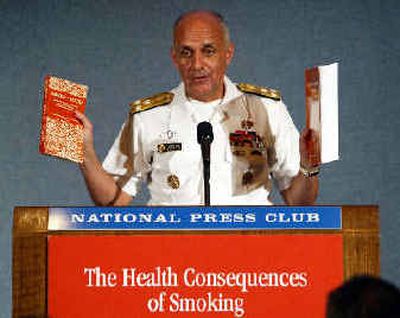Smoking linked to new ailments

WASHINGTON – Cigarette smoking significantly harms almost every major organ of the body and has been directly linked to a new series of illnesses including leukemia, cataracts, pneumonia and cancers of the kidney, cervix, pancreas and stomach.
Yet 45 million Americans still smoke and the rate at which they are quitting has slowed significantly in recent years.
Forty years after the first groundbreaking surgeon general’s report on smoking, which said that cigarettes caused lung cancer and chronic bronchitis, Surgeon General Richard Carmona on Thursday gave his assessment of the state of scientific knowledge about cigarette smoking. His conclusions were stark.
“We’ve known for decades that smoking is bad for your health, but this report shows that it’s even worse,” he said. “The toxins from cigarette smoke go to everywhere the blood flows.”
The report, which cites 1,600 scientific studies into the effects of tobacco, described findings that associate cigarette smoking with colorectal, liver and prostate cancer, as well as erectile dysfunction. But it said more study is needed to determine if there is the kind of direct cause-and-effect relationship found with other cancers and leukemia. Carmona said that research has shown that low-tar and low-nicotine cigarettes do little or nothing to minimize the harm of tobacco. “There is no safe cigarette, whether it is called ‘light,’ ‘ultra-light’ or any other name,” Carmona said. “The science is clear: The only way to avoid the health hazards of smoking is to quit completely or to never start smoking.”
Despite the report’s strong words about the known consequences of cigarette smoking, which is estimated to cause 440,000 premature deaths annually, Carmona was reluctant to discuss some of the congressional and international initiatives under way to reduce smoking.
He declined to offer an opinion about pending legislation that would give the Food and Drug Administration regulatory authority over tobacco, about state initiatives to ban indoor smoking and about whether the administration plans to send the international treaty on tobacco control to the Senate for ratification.
This reluctance was in sharp contrast to his congressional testimony last year, when he made headlines by saying he would “support banning or abolishing tobacco products … I see no need for any tobacco products in society.”
Carmona’s hesitancy Thursday to discuss policy issues led Matthew Myers, president of the Campaign for Tobacco-Free Kids, to say, “Neither Congress’ nor the administration’s actions on tobacco are consistent with the serious findings of the surgeon general’s report. Much more needs to be done.”
M. Cass Wheeler, chief executive of the American Heart Association, said the new report should inspire more aggressive tobacco control measures. “At the state level,” she said, “we should continue doing what has been demonstrated over and over to be effective: Raise the price of tobacco through excise taxes, ban smoking in all workplaces and other public places and use money from the Master Settlement Agreement (with tobacco companies) to fund comprehensive prevention programs.”
Although aggressive anti-smoking programs have reported success in states including California and Massachusetts, the overall national smoking rate appears to be stable.
A report for the Centers for Disease Control and Prevention released Thursday said that the 22.5 percent of U.S. adults described themselves as smokers in 2002, down slightly from 22.8 in 2001. This decline is too slow to achieve the federal government’s goal of reducing the number of smokers to 12 percent of the adult population by 2010.
Carmona said Thursday that Health and Human Services Secretary Tommy Thompson has decided to allocate $25 million to set up a national quit-smoking telephone line, where smokers can call in for information about how to stop and get support for the often difficult process.